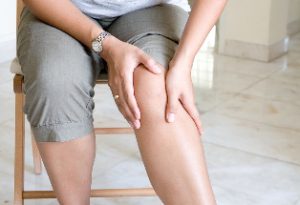 Our joints endure a lot of stress over an extended period of time. If you’re experiencing joint pain for any reason, it can be frustrating, and of course, painful. Luckily, there are steps we can all take to minimize joint pain and live a more active, comfortable life.
Our joints endure a lot of stress over an extended period of time. If you’re experiencing joint pain for any reason, it can be frustrating, and of course, painful. Luckily, there are steps we can all take to minimize joint pain and live a more active, comfortable life.
Exercise
Exercise can relieve joint pain on multiple fronts. First, it can help you lose excess weight, which we’ve already covered. But exercise also directly impacts the health of your joints by making them more flexible. Running isn’t the best for people experiencing joint pain, so opt for lower-impact options, such as swimming and other water-based exercise routines, cycling, walking and light resistance training.
Exercise is also great as a preventative measure. But if you already experience joint pain, don’t start an exercise regimen before consulting your doctor or a licensed fitness expert.
On a related note, there are non-exercise physical habits you should consider. For instance, be mindful of your posture. Don’t sit for extended periods of time. Get up and stretch or walk around, maybe once or twice an hour. Active lifestyles minimize the amount of time your joints get prolonged stress from one particular position, but also keeps your bones and the rest of your body more limber.
Dietary Options
Diet is another multi-pronged approach to joint pain relief. Like exercise, it too will help reduce your excess weight. There are also ingredients that can have a therapeutic effect on your joint pain. The best known of these is omega three fatty acids. Salmon, walnuts, and flaxseeds are just a few omega 3-rich food sources.
Medications
It’s always best to first attempt the natural ways to relieve joint pain. But there comes a time for many of us where we need to rely on medication, at least as a compliment to our other efforts. Your doctor may recommend over-the-counter anti-inflammatory drugs, or even prescribe you one. Besides oral medicines, you may consider topical analgesic creams.
Weight Loss
While it’s not the only cause of joint pain, excess weight is certainly a leading reason people suffer from it. The reason is simple: the more weight we carry, the more difficult it is in our bodies. If you have excess weight, you are putting extra stress on joints in your feet, knees, and hips. Reducing weight can relieve pain and improve mobility. Better yet, it can help avoid future joint damage.
If you have struggled with your weight for some time and are considering weight loss surgery, the same potential benefits apply. According to a recent study from the American Society for Metabolic and Bariatric Surgery, about 70 percent of bariatric patients with severe knee and hip pain, saw an improvement in joint pain and function. Amazingly, 57 percent of patients reported having significant mobility problems didn’t have them after their surgery.
Gastric Bypass Osteoarthritis Study
Osteoarthritis (OA) is a common ailment of people who struggle with obesity. Associated symptoms, such as joint stiffness and pain may be positively impacted after gastric bypass surgery, according to a study presented at the American Academy of Orthopaedic Surgeons’ annual meeting.
Researchers examined knee pain and physical function in 20 people who had osteoarthritis symptoms in their knees and also underwent gastric bypass surgery. Then they compared them to 40 patients who had total knee replacement surgeries.
 The groups were matched two-to-one according to age, gender and BMI. They took a look at the patients symptoms before their surgeries, six months after they had surgery, and a year after. What they found was that patients who had gastric bypass surgery saw the same, and sometimes better, reduction of knee pain and improved physical function as those who had a total knee replacement.
The groups were matched two-to-one according to age, gender and BMI. They took a look at the patients symptoms before their surgeries, six months after they had surgery, and a year after. What they found was that patients who had gastric bypass surgery saw the same, and sometimes better, reduction of knee pain and improved physical function as those who had a total knee replacement.
Six months after surgery. Improvements in pain from both groups were very similar. The bariatric group had a mean 49.9 percent improvement in their knee pain. The total knee replacement group experienced a 58.3 percent average improvement in pain symptoms.
After one year. The bariatric group kept pace after a year. The gastric bypass group reported a 62.7 percent mean pain improvement, while the knee replacement group reported a 68.2 percent improvement.
Physical function improvement. This is where the gastric bypass group beat out the total knee replacement group, and in a resounding manner. Six months after having bypass surgery, physical function improved by an average of 66.3 percent. Those who had knee replacement surgery only saw a mean improvement of 46.7 percent.
The knee replacement group made up a little ground after 12 months. A year after their gastric bypass surgery, the bariatric patients reported an average improvement in their physical function of 68.4 percent. The average improvement in physical function for the the total knee replacement group was 51.5 percent.
Decide What Plan Will Work Best for You
There are plenty of ways you can be proactive about preventing or relieving joint pain. While it’s great to be excited about taking action, it’s good first to speak with your doctor to help develop your plan of attack. If you’re considering weight loss surgery for any reason including joint pain, call our office today. We can help you determine the best course of action for you and your lifestyle.
You May Also Like